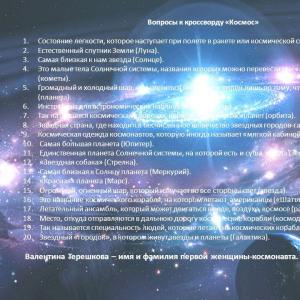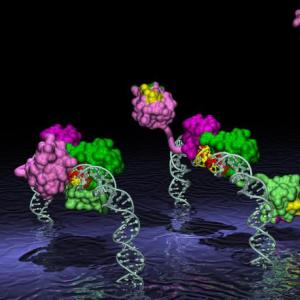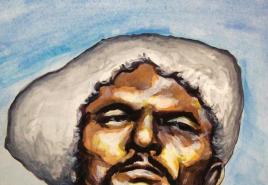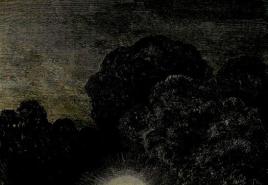“Ferret. Comparative characteristics of Khor and Kalinich (based on Turgenev’s story “Khor and Kalinich”) Portrait description of the ferret table
Characteristics of the hero
KORH is the hero of I. S. Turgenev’s story “Khor and Kalinich” (1847) from the series “Notes of a Hunter.” This is one of the most interesting peasant types of Russian literature. He personifies a healthy practical principle: being a quit-rent peasant, X. lives independently of his landowner, Polutykin, his farm is well-established, he has many children. The author especially notes the active mind of his hero as an integral part of his nature. This is manifested in conversations with another hero of the Notes - the narrator: “from our conversations I took away one conviction that Peter the Great was primarily a Russian person, Russian precisely in his transformations. What’s good is what he likes, what’s reasonable is what you give him, and where it comes from is all the same to him.” This comparison, as well as the comparison of X’s appearance with the appearance of Socrates, gives special significance to the image of X. The most important remedy The characteristics of this hero are a parallel with another character, Ka-linich. On the one hand, they are clearly opposed as a rationalist and an idealist, on the other hand, friendship with Kalinich reveals in the image of X. such features as an understanding of music and nature. The character of the hero is also reflected in a unique way in his relationship with Polutykin: there is no dependence in X’s behavior, and he is not redeemed from the serfs for some practical reasons. X. is not the only such type among Turgenev’s heroes. In “Notes of a Hunter” a certain image of the Russian national character is formed, testifying to the viability of this solid, businesslike principle. Along with X., he includes such heroes as the one-palace Ovsyannikov, Pavlusha, Tchertop-hanov, and the district Hamlet. Features of this literary type found later in Turgenev in the form of Bazarov.
(9)
In the story “Khor and Kalinich” Turgenev depicts two opposite types of peasants, more often than others encountered in life.
Khor is an intelligent and practical person; he knows how to get along in life. Khor realized that the farther from the master, the better; Therefore, he begged permission to settle in a swamp in the forest. Here he began trading in “oil and tar” and became rich. However, Khor did not want to pay off the master because, in his opinion, it is more profitable to live behind the master: “you will end up completely free people, then whoever lives without a beard (that is, every official).
Khor's practicality is also evident from the fact that he does not teach his sons to read and write, although he is aware of its benefits. He knows that those who are literate will immediately be taken to the manor’s court, and then his friendly family will be upset. Like all men, Khor looks at women with contempt. “Women are stupid people,” he says: why touch them? They do such trifles. It’s not worth getting your hands dirty.”
The ferret also does not pay attention to the cleanliness and tidiness of the house. But these minor flaws do not obscure the majestic, respectable figure of Khor. In terms of his hard work, economic knowledge and experience, he stands much higher than his master. The conclusion directly follows from the story that such a person cannot be deprived of his freedom, and meanwhile, during the times of serfdom, the landowner could easily ruin his farm, insult, humiliate and even sell him to another landowner.
Kalinich, according to Turgenev’s definition, is an “idealist-romantic.” He has an enthusiastic, dreamy character and therefore does not like to do housework. He turned all his attention to the study of nature. He can charm blood, fear, rabies, and can drive worms out of wounds; His bees don’t die, “his hand is light.” Kalinich has a kind, gentle heart. He treats all people with love, and looks after his master, the landowner Polutykin, like a child.
“Don’t touch him with me” (that is, don’t judge him), he says about his master to his friend Khor. “Why doesn’t he sew boots for you?” Khor objects. - “Eka, boots! What do I need boots for? “I’m a man,” Kalinich answers. But Polutykin did not at all appreciate Kalinich’s enthusiastic, selfless affection for him, and when asked by the author what his opinion was of Kalinich, Polutykin coldly answered: “a zealous and helpful man; However, the farm cannot be maintained in good order: I keep putting it off. Every day he goes hunting with me... What kind of farming is here, judge for yourself.” Thus, Polutykin valued the peasants insofar as they did the farming and gave the master more income.
In the person of Kalinich, Turgenev depicted that side of the nature of Russian man, thanks to which in the past, types of obedient and devoted uncles and nannies were developed. In the past, the origin of these types was explained by the lenient attitude of landowners towards serfs, but Turgenev clearly shows us that these types are the product of the humane, loving nature of the common people.
Answer from Vahit Shavaliev[guru]
KALINYCH is the hero of I. S. Turgenev’s story “Khor and Kalinich” (1847) from the series “Notes of a Hunter.” In contrast to Khoryu, the hero of the same story, K. symbolizes the poetic side of the Russian national character. The everyday life of the hero, who does not have business acumen, is poorly organized: he has no family, he has to spend all his time with his landowner Polutykin, go hunting with him, etc. At the same time, there is no servility in K.’s behavior, he loves and respects Poluty - Tykina, completely trusts him and watches him like a child. The best character traits of K. are manifested in his touching friendship with Khorem. So, the narrator first meets him when K brings his friend a bunch of wild strawberries, and admits that he did not expect such “tenderness” from the man. The image of K. opens in “Notes of a Hunter” a whole series“free people” from the people: they cannot constantly live in the same place, doing the same thing. Among such heroes are Kasyan from “The Beautiful Sword”, Er-molai - the companion of the narrator-hunter, appearing in the stories “Yermolai and the Miller’s Wife”, “My Neighbor Radilov”, “Lgov”, etc. This type with his poetry, spiritual gentleness, a sensitive attitude to nature is no less important for Turgenev than a reasonable and practical hero: they both represent different, but complementary sides of the nature of Russian people. Following the tradition of Turgenev, two opposite characters, similar to Khor and K., are created by A. I. Kuprin in the story “Wilderness of the Forest” (originally “In the Wilderness of the Forest”, 1898). This is Sotsky Kirill and the forest worker Talimon, but a type like K. turns out to be more attractive to Kuprin, therefore his impractical, kind and modest Talimon is taller in his spiritual appearance than the narcissistic and talkative Kirill.
KORH is the hero of I. S. Turgenev’s story “Khor and Kalinich” (1847) from the series “Notes of a Hunter.” This is one of the most interesting peasant types of Russian literature. He personifies a healthy practical principle: being a quit-rent peasant, X. lives independently of his landowner, Polutykin, his farm is well-established, he has many children. The author especially notes the active mind of his hero as an integral part of his nature. This is manifested in conversations with another hero of “Notes” - the narrator: “from our conversations I took away one conviction that Peter the Great was primarily a Russian person, Russian precisely in his transformations. What’s good is what he likes, what’s reasonable is what you give him, and where it comes from is all the same to him.” This comparison, as well as the comparison of X’s appearance with the appearance of Socrates, gives special significance to the image of X. The most important means of characterizing this hero is a parallel with another character, Ka-linich. On the one hand, they are clearly opposed as a rationalist and an idealist, on the other hand, friendship with Kalinich reveals in the image of X. such features as an understanding of music and nature. The character of the hero is also reflected in a unique way in his relationship with Polutykin: there is no dependence in X’s behavior, and he is not redeemed from the serfs for some practical reasons. X. is not the only such type among Turgenev’s heroes. In “Notes of a Hunter” a certain image of the Russian national character is formed, testifying to the viability of this solid, businesslike principle. Along with X., he includes such heroes as the one-palace Ovsyannikov, Pavlusha, Tchertop-hanov, and the district Hamlet. Traits of this literary type are found later in Turgenev in the image of Bazarov.
Reply from 2 answers[guru]
Hello! Here is a selection of topics with answers to your question: characteristics of the polecat and Kalinich
Reply from Masha King[newbie]
Ferret: Bald, short, broad-shouldered and stocky old man. Reminds me of Socrates: high, knobby forehead, small eyes and snub nose. The beard is curly, the mustache is long. Movements and manner of speaking with dignity, slowly. He says little, but “understands to himself.” A quitrent peasant pays quitrent without buying his freedom. He lives apart from other peasants, in the middle of the forest, settling down in a cleared and developed clearing. Prosperous, with a well-established economy, he has money, gets along with the master and the authorities. The head of a large family, obedient and unanimous. His knowledge is extensive, but he cannot read and write. Expressed wisely, important, but with caution. “Strong in tongue and in mind.” Positive, practical person, rationalist, administrative head. It is closer to society and people. An ironic point of view on life. There is no man more active than him. “A smart guy,” according to Polutykin, whom Khor “sees right through.” The sons are tall, strong, their favorite is Fyodor, they tease each other with him. He believes that women are stupid people, but hard-working, helpful to the peasant in everything. He loves Kalinich and protects him. Kalinich A man of about forty, tall, thin, with a small, bent back head, a good-natured, attractive dark face, marked here and there with rowan berries. The face is meek and clear. He speaks slightly through his nose, smiles, squints his light blue eyes and often takes hold of his thin, wedge-shaped beard. He walks slowly, but with long steps, leaning lightly on a long and thin stick. He explains passionately. Lives in an apiary, in the very depths of the forest. His hut is clean, hung with bunches of dry fragrant grass, the farm is in good working order, but without proper maintenance. He gets by somehow and walks in bast shoes. I was once married and was afraid of my wife. There are no children and never were. He is engaged in witchcraft. Can read. Cheerful, gentle disposition. Not servile, but helpful and diligent. An idealist, romantic, enthusiastic and dreamy person. Closer to nature. He believes in everything blindly and does not like to reason. “A good man,” according to Polutykin, whom Kalinich reveres. Every day he goes hunting with the master, watching him like a child. Polutykin “cannot take a step” without him. Loves and respects Khorya.
Reply from Vova Protopopov[newbie]
Ferret Bald, short, broad-shouldered and stocky old man. Reminds me of Socrates: high, knobby forehead, small eyes and snub nose. The beard is curly, the mustache is long. Movements and manner of speaking with dignity, slowly. He says little, but “understands to himself.” A quitrent peasant pays quitrent without buying his freedom. He lives apart from other peasants, in the middle of the forest, settling down in a cleared and developed clearing. Prosperous, with a well-established economy, he has money, gets along with the master and the authorities. The head of a large family, obedient and unanimous. His knowledge is extensive, but he cannot read and write. Expressed wisely, important, but with caution. “Strong in tongue and in mind.” Positive, practical person, rationalist, administrative head. It is closer to society and people. An ironic point of view on life. There is no man more active than him. “A smart guy,” according to Polutykin, whom Khor “sees right through.” The sons are tall, strong, their favorite is Fedor, they tease each other with him. He believes that women are stupid people, but hard-working, helpful to the peasant in everything. Loves Kalinich and is his patron
Reply from Matvey Kuznetsov[newbie]
The ferret is one of the main characters of the story. He is a positive, practical person, an administrative head, a rationalist. Having settled in the swamp, Khor managed to get rich. He settled down, “accumulated some money,” got along with the master and other authorities, raised a large family, obedient and unanimous. Khor spoke little, chuckled to himself, he saw right through his master. Khor stood closer to people, to society, he was occupied with administrative and state issues. His knowledge was quite extensive, in its own way, but he could not read. Khor could not live without work, he was constantly doing something: either repairing a cart, propping up a fence, or revising harnesses. He lived in an estate that rose in the middle of the forest, in a cleared and developed clearing. This is how Khor appears before us.
Kalinich too main character story, but he is not at all like his friend Khorya. Kalinich was one of the idealists, romantics, enthusiastic and dreamy people. He walked in bast shoes and managed to get by somehow. He once had a wife, whom he was afraid of, but had no children: Kalinich, unlike Khor, was in awe of his master, explained himself passionately, “although he did not sing like a nightingale, like a lively factory man.” Kalinich was gifted with such advantages that Khor himself recognized: “he charmed blood, fear, rabies, driving out worms; the bees were given to him, his hand was light.” Kalinich stood closer to nature, he was more touched by the descriptions of mountains and waterfalls than by administrative and government issues. He lived in a low hut and could not support the farm. He could read, sang well and played the balalaika.
Only Khor and Kalinich liked music; it united them. Khor really loved the song “Share, you are mine, share! “And Kalinich knew this well. As soon as he starts playing, Khor begins to chime in with a plaintive voice. Here the theme of the musical talent of the Russian people manifests itself for the first time. This is how Kalinich appears before us.
The story “Khor and Kalinich” in the series “Notes of a Hunter” reveals internal forces of a Russian person, the prospects for his further growth and development, reveals their giftedness, talent, and their high spiritual qualities. Turgenev leads the reader to the idea that all “living Russia, not only peasants, but also nobles, should take part in the fight against the national enemy.
Composition
KALINYCH is the hero of I.S. Turgenev’s story “Khor and Kalinich” (1847) from the series “Notes of a Hunter.” In contrast to Khoryu, the hero of the same story, K. symbolizes the poetic side of the Russian national character. The everyday life of the hero, who does not have business acumen, is poorly organized: he has no family, he has to spend all his time with his landowner Polutykin, go hunting with him, etc. At the same time, there is no servility in K.’s behavior, he loves and respects Polutykin, completely trusts him and watches him like a child. The best character traits of K. are manifested in his touching friendship with Khorem. So, the narrator first meets him when K brings his friend a bunch of wild strawberries, and admits that he did not expect such “tenderness” from the man. The image of K. in “Notes of a Hunter” reveals a whole series of “free people” from the people: they cannot constantly live in the same place, doing the same thing. Among such heroes are Kasyan from “The Beautiful Sword”, Yer-molai - the companion of the narrator-hunter, appearing in the stories “Yermolai and the Miller’s Wife”, “My Neighbor Radilov”, “Lgov”, etc. This type with his poetry, spiritual gentleness, a sensitive attitude to nature is no less important for Turgenev than a reasonable and practical hero: they both represent different, but complementary sides of the nature of Russian people. Following the tradition of Turgenev, two opposing characters, similar to Khor and K., are created by A.I. Kuprin in the story “Wilderness of the Forest” (originally “In the Wilderness of the Forest”, 1898). This is the sotsky Kirill and the forest worker Talimon, but a type like K. turns out to be more attractive to Kuprin, therefore his impractical, kind and modest Talimon is taller in his spiritual appearance than the narcissistic and talkative Kirill.
Other works on this work
Why did I. S. Turgenev’s “Notes of a Hunter” please readers so much and frighten the authorities (based on the stories “Bezhin Meadow” and “Biryuk”) Comparison of Pavlusha with Ilyusha. How do these boys make the author feel? (I.S. Turgenev “Notes of a Hunter”)| Hero | Portrait | Social status | Character Traits | Relationships with other heroes |
| ferret | Bald, short, broad-shouldered and stocky old man. Reminds me of Socrates: high, knobby forehead, small eyes and snub nose. The beard is curly, the mustache is long. Movements and manner of speaking with dignity, slowly. He says little, but “understands to himself.” | A quitrent peasant pays quitrent without buying his freedom. Lives apart from other peasants, in the middle of the forest, settling on a cleared and a developed clearing. Prosperous, with a well-established economy, he has money, gets along with the master and the authorities. The head of a large family, obedient and unanimous. His knowledge is extensive, but he cannot read and write. | Expressed wisely, important, but with caution. “Strong in tongue and in mind.” Positive, practical person, rationalist, administrative head. It is closer to society and people. An ironic point of view on life. There is no man more active than him. | “A smart guy,” according to Polutykin, whom Khor “sees right through.” The sons are tall, strong, Fyodor is his favorite, his friend teases him over a friend. He believes that women are stupid, but hard-working people, helpful to the peasant in everything. He loves Kalinich and protects him. |
| Kalinich | A man of about forty, tall, thin, with a small, bent back head, a good-natured, attractive dark face, marked here and there with rowan berries. The face is meek and clear. He speaks slightly through his nose, smiles, squints his light blue eyes and often takes hold of his thin, wedge-shaped beard. He walks slowly, but with long steps, leaning lightly on a long and thin stick. He explains passionately. | Lives in an apiary, in the very depths of the forest. His hut is clean, hung with bunches of dry fragrant grass, the farm is in good working order, but without proper maintenance. He gets by somehow and walks in bast shoes. I was once married and was afraid of my wife. There are no children and never were. He is engaged in witchcraft. Can read. | Cheerful, gentle disposition. Not servile, but helpful and diligent. Idealist, romantic, enthusiastic and dreamy person. Closer to nature. He believes in everything blindly and does not like to reason. | “A good man,” according to Polutykin, whom Kalinich reveres. Every day he goes hunting with the master, watching him like a child. Polutykin “cannot take a step” without him. He loves and respects Khorya. |
| Ermolai | A man of about forty-five. Tall, thin, with a narrow forehead, a long and thin nose, gray eyes, wide mocking lips and tousled hair. All year round walks in a wide nankeen caftan of German cut, girded with a sash. Wears blue trousers and a hat with smushkas. He looks distracted and awkward. When walking, it swings its legs and rolls from side to side, but moves quickly. Sometimes an expression of sullen ferocity appears on the face. | Hunter. A sharp shooter. It belongs to a landowner of the old style, but he is allowed to live “where he wants and what he wants.” With the money received for game he can buy a bag and bandoleer, but does not consider it necessary to do this, using a hat and bags screwed to the sash for this purpose. A tramp, respected by no one. Married, he visits his wife once a week in a crappy, dilapidated hut. Not very educated. | A “getting along” person, not fit for any job. Carefree, talkative. He likes to drink and doesn't get along well. Constantly gets into trouble. Oddball. One cannot call him cheerful, but he is almost always in good spirits. Lover to talk to good people, but not for long. Good-natured and carefree. Has a lack of patience. Skilled in fishing and hunting. | Never feeds the dog. He treats his wife rudely and harshly. Everyone treats him with good-natured ridicule, as if he were an eccentric, and the lowest of the servants considers himself superior to him. He talks down to the hunter Vladimir and the fisherman Kuzma Suchok in a haughty, threatening manner. He boldly walks along the ford he found in the pond, despite his inability to swim, and shouts with importance. Unreliable, one day he drinks away all the money given by the master for purchases. |
| Biryuk | A tall fellow, broad-shouldered and well-built, with powerful muscles. A stern and courageous face with a black curly beard. Small brown eyes with fused wide eyebrows. | Forester. He performs his duties properly. He lives poorly, in a small hut consisting of one room, in the middle of a vast yard surrounded by fences. The room is unkempt, illuminated by a torch. The wife ran away, two e children. | Harsh. Honest. “Nice fellow”, who is not alien to compassion. A strange and mysterious man. | All the men are afraid of him like fire. But he releases the desperate, captured poor man after a short internal struggle. |
| Tchertophanov Panteley Eremeevich. | A small, blond man, with a red upturned nose and a very long red mustache. The eyes are pale blue, “glassy”, running and squinting. Looks like an “Indian rooster”. Speaks quickly, fragmentarily, harshly and nasally. Dressed in a yellow, worn-out archaluk, with faded braid at the seams and black corduroy cartridges on the chest. There is a dagger in the belt and a horn over the shoulder. On the head is a pointed Persian hat with a crimson cloth top. In all his appearance and movements there is exorbitant pride and extravagant courage. | A nobleman from an old, impoverished family. He served in the army, but retired as an ensign. Has a mortgaged village of Bessonovo, 35 males, 76 females, 14 acres of land without documents. The house is dilapidated, there is almost no furniture in the rooms. The situation is miserable. Education is superficial. He lived with the gypsy Masha until she left him. | He grew up a darling and a gentleman. Pompous, arrogant. A dangerous and extravagant bully and proud man. Wild and embittered due to the loss of inheritance. Pure, not involved in anything, with a kind soul. Cannot stand oppression and injustice. Fearless and selfless. | He doesn’t know his neighbors: he is ashamed of the rich, he abhors the poor. He treats everyone insolently, even the authorities. They are afraid of him, no one goes to see him. She stands up for her men like a mountain. He stood up for Nedopyuskin in front of Shtoppel, forcing him to ask for forgiveness for his behavior. He is passionately in love with Masha, and after the death of Nedopyuskin, he erects a statue on his grave, spending all the funds from the village bequeathed to him. Saves the Jew from reprisals. His greatest affection and cause of death was his horse Malek – Adele. |
| Nedopyuskin Tikhon | Plump, about forty years old. The voice is thin and soft. The face is plump and round, shy, expressing good nature and meek humility. The nose is also plump and round. On his head is a green leather cap. Balding, thin brown braids stick out from behind. The eyes are narrow, the lips smile sweetly. | The son of a poor nobleman, who achieved nobility after forty years of service. He was a regular official in the office, but retired. He was in different positions, in a repaired existence. He inherited from his benefactor the village of Besselendeyevka with land and 22 peasant souls. | Unusually timid, sensitive, lazy, soft and receptive. Voluptuary. Not entirely clean. | Shtoppel responds to Shtoppel’s rudeness with a painful trembling, not daring to object. He treats his defender Tchertopkhanov with obsequious reverence. He dies after Masha's action. |
Other works on this topic:
- Kalinich Kalinich is one of the main characters in I. S. Turgenev’s story “Khor and Kalinich” from the series “Notes of a Hunter.” In contrast to Horyu, this hero is the personification...
- Comparative characteristics Khor and Kalinich “Khor and Kalinich” is the first story from the series “Notes of a Hunter” by I. S. Turgenev. He appeared in the Sovremennik magazine in...
- Khor Khor is one of the main characters in I. S. Turgenev’s story “Khor and Kalinich” from the series “Notes of a Hunter”. This is one of the best examples of Russian peasant...
- Oblomov Stolz Origin From a wealthy noble family with patriarchal traditions. his parents, like grandfathers, did nothing: serfs worked for them. From a poor family: father...
- On a hot summer day, Ermolai and I were returning from hunting. Along the way we came across an area densely overgrown with bushes. The temptation to get grouse was very great, and we...







